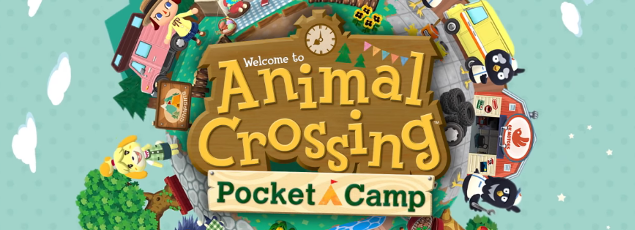
There's this opinion about Nintendo which I've seen swimming around forums ever since the release of the DS in 2004. It's usually expressed in an exasperated voice and asked as a question: "When is Nintendo going to drop their handheld consoles and switch to mobile?". The implication being that that is something the company could and should do. The DS, 3DS, and mobile devices all trade in technologically modest titles and touchscreen controls, and they target a userbase beyond 18-35 males so why not just consolidate all the games onto Android and iOS to reduce the number of plastic lumps we're carrying around in our pockets? When you see what the platforms share you might start to wonder why people wouldn't root for the next Pokemon or Zelda to come out on mobile and tablets, but only as long as you don't think about what the devices don't share. Nintendo's handhelds have physical buttons that allow for complex inputs and a tactile experience you won't find on a phone, 3DS game carts can carry up to 8GB which allows for far more code and assets than would be sensible for a phone app, and the average RRP of a handheld game is many times that of a mobile game which facilitates far more inflated game budgets. These are just the CliffsNotes, but the bottom line is that we're not even close to being able to rip a 3DS cart and just dump its contents onto iTunes or the Google Play store. Consequently, when adapting a handheld console game to mobile, you have to leave a lot of it on the cutting room floor.
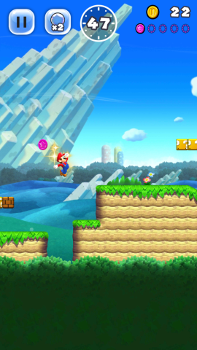
Unless your game is hideously overdesigned, then erasing mechanics from your software is like pulling matches out of a matchstick house. You might be able to pinch a few but take too many or take a load-bearing stick, and the whole thing will come tumbling down. It's why Super Mario Run felt so flimsy. Like their other handheld properties, Mario provided Nintendo with an audio-visual style made for the small screen, and by making it an endless runner, Nintendo seemed to be distilling Mario down to its purest mechanic: the jump, and who doesn't love the Mario jump? But it wasn't just the jump we applauded in Mario games; it was the use of that jump as part of a full stable of movement controls. Pokemon Go had better luck Xeroxing a single system out of its console counterpart and making it work on mobile, but then it handled that system in a manner that considered the portability of a mobile device. The title was designed closer to the tried and tested way of creating entertaining mobile games: You craft software from the ground up with the platform in mind instead of dismembering software from another device until it fits the new platform. This method is how Square Enix adapted Hitman and Tomb Raider to phones and look at how well they turned out.
It's intuitive to think that Animal Crossing may be an exception to the rule because it has some parallels with a lot of what you can download from app stores. In both Animal Crossing and many F2P phone games, the player returns to them habitually because real-world timers gate in-game rewards. Just like you might have to step away from Farmville for a few hours while your vegetables grow, you might have to step away from Animal Crossing for a few hours while you wait for the nocturnal bugs to come out. But these similarities alone aren't enough to make an Animal Crossing mobile adaptation work. It turns out that Animal Crossing is a lot more mechanically bulky than you might think. What I'm writing here is based on version 1.1 of Animal Crossing: Pocket Camp, and while the ongoing updates to the product may invalidate some of the criticisms here, the goal of this article is not to give a picture-perfect analysis of Pocket Camp's mechanics. What I want to do is give a general explanation of why Pocket Camp doesn't match up to previous Animal Crossing games, and more than anything, talk about how game mechanics contextualise each other.
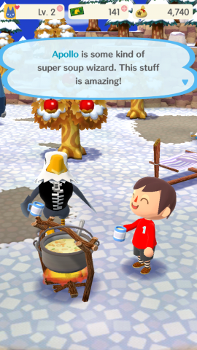
To think about the process of adapting a game to mobile, we need to think about the concept of "core gameplay" because we have this idea that every game has a hook around which the rest of it is organised. The core mechanics of Mario are the jumping, and maybe general movement, the core mechanics of Contra are side-scrolling shooting, and so on. But keep listing titles, and you'll find games staring back at you that don't seem to contain a central mechanic or dynamic. For example, you won't find a "core mechanic" in any action-adventure games, open-world crime games, or in Animal Crossing. This is because unlike Mario or Contra, which are emulating one activity like running an obstacle course or gunning down enemy troops, these other games are building towards a desired aesthetic by including multiple jobs for you. A lot of games that do this are either trying to simulate a certain lifestyle or trying to make you feel like you're inside a film, with films tending to draw more from real-life than video games do. Life is never one task over and over, so neither are these games.
Far Cry has you poaching, skinning, and shooting because you need all of these actions to feel like an island survivalist; Grand Theft Auto has you playing driver and gunman so that you feel like you're an actual criminal or that you could be right in the thick of a Scarface scene. Animal Crossing has you fishing, catching bugs, shopping, and chatting with neighbours, so you're roleplaying rural town life and foraging in the forest. You can't just port over the heart of Animal Crossing by remaking one system from it because it's not about one system; it's about a lot of little systems that add up to a thematic whole. Consequently, if you want to make a mobile Animal Crossing, you have to reconstruct a lot of mechanics on a platform where developing mechanically complex games can be like getting blood from a stone.
From a distance, it may seem that Pocket Camp has done the impossible. The game contains most of the activities that the other Animal Crossings do, and so it seems rational to conclude that it's a mostly accurate remake of those games. Various professional criticisms of the game adhere to this view, including Jonathan Dornbrush's review for IGN in which he writes:
"[Pocket Camp] has all the activities you’d expect from an Animal Crossing adventure. You’re still befriending neighborly animals, collecting fruit, hunting bugs, and customizing your living space".
He goes on praise the game on these grounds. Writing about the game for Destructoid, reviewer C.J. Andriessen gave similar reinforcement of this idea, saying:
"Pocket Camp looks, plays and charms just like a standard Animal Crossing game, only miniaturized. [...] I am doing those standard Animal Crossing activities that have been with the series since its debut. I’m still shaking trees to collect fruit, fishing for sea and river creatures, catching bugs, and collecting seashells".
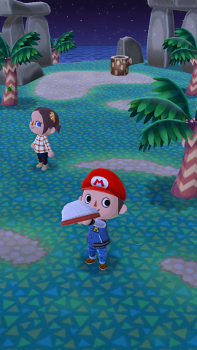
To Andriessen's credit, he does later describe how the game compromises these activities, but both of these reviews contain examples of the same argument: "Game A contains Activity X, Game B contains Activity X. Therefore Game B plays like Game A". But Animal Crossing: Pocket Camp doesn't feel like Animal Crossing, and it doesn't feel that way because there is a fatal flaw in the above logic. To understand that flaw we need to talk about mechanics and resources, and we're going to start somewhere far, far away from Animal Crossing.
You probably know the Active Reload mechanic from Gears of War. When you press the reload button in Gears, you can choose to take a small timing-based challenge. Depending on your performance in that challenge, the reload will go slower or faster, or spit out some rounds which do more damage than your regular ammo. Active Reload is an example of a resource-producing mechanic; we employ it because it gives us a resource that we can spend elsewhere in the game's systems, but this also means that the way we think about, value, and employ Active Reload is dependent on the nature of those other systems.
When Gears's play is operating as it should, hitting that little white notch in the reload minigame is pleasing. This is not just because we feel like we displayed competent hand-eye coordination but also because we are happy to have a fresh clip in our gun sooner rather than later. We value a full magazine because we know it sets us up for another minute of responsive, meaty shooting, and shooting Locust dead is the game's main objective. If rounds were a useless resource within the gameplay, we would care a lot less about getting the Active Reload right, and if they didn't set us up for exciting play, then there wouldn't be the electric sense of anticipation we get when we make a whole magazine of them available to us.
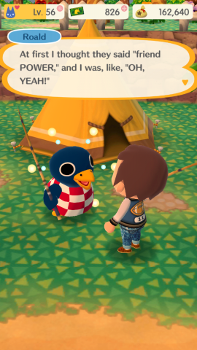
When the original Gears of War released in 2006, Epic Games received plenty of kudos for the Active Reload mechanic. However, when we praise that mechanic what we're praising is not that mechanic alone but the way in which it interacts with the rest of the game, or at least, we're praising that mechanic contextualised by the other mechanics. For other examples of resource-producing mechanics and how they are coloured by the use of those resources, think about the Super Gauge in Street Fighter or the mining in Minecraft. In all cases, we cannot make value judgements about these resource-producing mechanics alone; how we feel about them is always affected by what the involved resources mean to the other systems of these games.
Here is a related idea: Items in video games are concrete representations of otherwise abstract abilities to change the state of play. This is not as complicated as it sounds; it just means that a first aid kit in PUBG is a concrete manifestation of the ability to fill your health bar and the Black Wolf Mail in Everquest is a concrete manifestation of the ability to increase your armour by 12. Once you understand this, you understand that even if two games use the same name and same graphic for two items, they can still be different items because the abilities those items convey can differ. For example, if Daybreak brought out a new Everquest with nearly identical mechanics, containing an item called "Black Wolf Mail", and that Black Wolf Mail had the same sprite as the BWM in Everquest 1, if it increased armour by 13 instead of 12, it wouldn't be the same item. Now, we can put these ideas together to describe the play of Animal Crossing accurately. Let's look at the difference between fishing in the older Animal Crossing games vs. in Animal Crossing: Pocket Camp.
In all of these games, fishing consists of throwing a lure into a body of water, waiting to hook your prey, and reeling them in, at which point the fish is deposited in your inventory. But taking into account the above ideas about items and resource-producing mechanics, we know that the games having near-identical execution of fishing does not mean that the "fishing" in the console Animal Crossings and the "fishing" in this mobile Animal Crossing are the same activity. We have to look at how the resource this activity produces (the fish) is spent in each game. In classic Animal Crossing, you can use fishes as decoration in your home, donate them to the museum, or sell them for bells (the in-game currency). In Pocket Camp, you can't use fish for decoration, and there's no museum, but you can sell them or use them to complete fetch quests. So fishes, having different properties in Pocket Camp, are not the same items they were in previous Animal Crossing games; therefore fishing is not the same activity it was in past Animal Crossing games. Everything I've said about fishing also applies for bug-catching, and other activities like shopping and decorating are also wholly reshaped. As in previous games, you can trade goods for bells and bells for furniture, but those transactions mean something different when we can't place furniture the same way we did in previous games and when we may place it for different reasons.
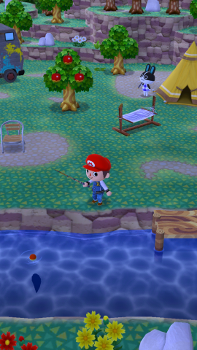
For the first time, you're given a mechanical reason to return to the place you've put your time and creativity into decorating. In Pocket Camp, you furnish a campsite where other villagers live, and every few hours, you can drop into that campsite to increase your friendship level with them and collect gifts from their generous little paws. By assembling a home from not just belongings but also people, you end up with what feels like a clubhouse instead of the lonely mansion you were often piecing together in the prior games. But, as best as I can tell, you get less space to unleash your creative side in this game than in other Animal Crossings. You have an RV that you can expand the square feet of, but your campsite has a finite number of squares you can work on, and you can't add more rooms to your camper as you could to the houses in previous Animal Crossings. Your phone screen also doesn't flaunt your interior design as well as a TV or DS did because you're looking at a horizontally-oriented environment on a vertically-oriented display. And keep in mind that in the original Animal Crossing, you didn't just beautify your town through switching out the rugs or lamps in your house, but also through cultivating the plants in the great outdoors. An algorithm generated the unique village you called home, and you could grow flowers or trees there or chop down anything that was in your way. So you didn't just end up with a town, you ended up with your town.
You'll notice that Pocket Camp doesn't let you travel to other peoples' villages; it only lets you travel to other peoples' camps, and that's because there's nothing to see outside of their campsite that you can't see in your world. All of the areas outside the site are identical in everyone's saves because the game does not generate them algorithmically, and it is too uptight to let you plant anything in them or chop down anything that's already there. If you want to do any gardening, you have to do it in one of the twenty designated soil holes next to your camp. It's that dire.
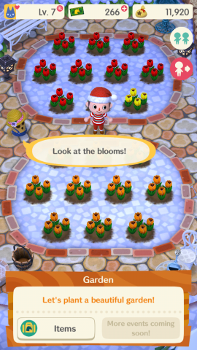
The areas outside the camp are not there to make you feel at home or for meeting animals in the wild; they are there for generating resources and are organised according to the resources they provide. There's the fruit area, the insect area, the market area, etc. Not only does this approach to environment stomp a boot down on player expression, but it makes the world feel inorganic. In the real world, many animals and geographic features don't stay confined to designated zones; this idea of specific cells for specific activities is a human one, and it sucks all the wonderment out of Animal Crossing. It used to give me a jolt of glee to be idly wandering my town and suddenly spot a rare beetle or my blue squirrel pal. In Pocket Camp, you know where to find most of your best friends because they're at your home base and anything else you can teleport to by tapping the corresponding icon on the map.
In this layout, everywhere is secondary to the campground. The camp contains not just the permitted player expression rectangle but is also the sinkhole into which you're trying to suck all the villagers. There's a clear supply chain in the game: You harvest fruit, insects, and fish when they spawn in, you perform fetch quests where you trade those resources for crafting materials, you exchange the crafting materials for furniture, and you use the furniture to entice new forest friends to your campsite. Those new camping buddies may also help you amass more materials as the volume of resources you need to craft the average piece of furniture rises. Previous Animal Crossing games were not this based on trade, but Pocket Camp is; it's mostly a bunch of resource-producing mechanics stuck together, and it asks for your time more frequently than the other titles in the series did.
Fortunately, you never have to worry about the store closing in this game which was a harsh restriction in the previous titles, but there's also the niggling sense that the shop stays open 24/7 so that the designers can nudge you into compulsively coming back to the app around the clock. Animal Crossing has always been a game of cycles: The series before now had seasons and times of day which changed in real-time, and the fauna you could catch changed with that calendar and that clock. This gave you the sense of a natural place ticking over, but that organicness falls away as Pocket Camp decides you can catch any creature in any month, day or night. At the same time, the game still works on a stringent cycle, and it's one where every three hours new animals with new fetch quests spawn in, and any fruit you've picked regrows. If you don't trade with those animals in that three-hour gap, they move on, and if you don't pick that fruit, you're that bit less efficient. Miss days on the game and you'll also miss login rewards and daily goals which provide more resources. Where Animal Crossing once used its timers to give the illusion of a wildlife habitat around you, it now uses them to create a fear of missing out.
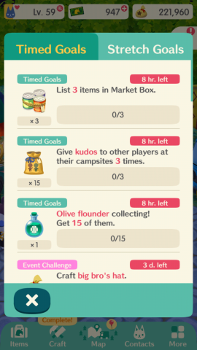
Having this be the framework in which you connect with your villagers creates a disconcerting formality. The animals pretend that the items you give to them and the items you get in return are "gifts" but exchanging one commodity for another commodity is not gifting, that's trading. Additionally, having a regular and busy pattern of trading is not a friendship, it's a business relationship. What's more, even if you're best friends with these animals, they won't visit your home unless the decor suits their tastes. Another game would reserve that kind of pickiness for only the most arrogant of characters. Remember, in games, the eventual application of a resource contextualises both that resource and the process of obtaining it. My point is that while Animal Crossing: Pocket Camp might still let you hook Red Snappers and net Tiger Butterflies, their application is not to act as decoration or as part of a collection or to be traded for any purely cosmetic item. Their purpose is for you to spend them in an economics simulator which is trying to masquerade as a friendship simulator. And now that the resources in that economy can slip away every three hours, instead of fruit picking or furniture placement being hobbies you can take your time on and chill out with at the end of a long workday, you have to jump to attention on them or risk falling behind.
It's not that this is a more economically-focused Animal Crossing that still retains the fishing, bug-catching, and other past-times of previous games, it's that because the game is more economically-focused, fishing, bug-catching, etc. change from being exercises of roleplaying and relaxation to exercises of production. I believe that Animal Crossing: Pocket Camp is a pertinent example of why we should think of resource-producing mechanics as contextualised by the application of their resources. When we fail to do so, we only see games skin deep and risk being sucked into experiences that are aesthetically undesirable. In this example, we might think that we're going to be laying back with some forest friends and enjoying the fruits of nature, but we really end up stressing over dwindling supplies and closing trade windows.
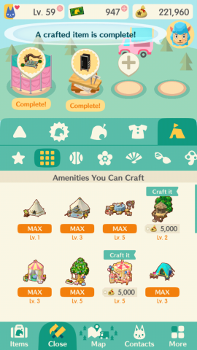
The shape of Animal Crossing: Pocket Camp has a lot to do with the economic restrictions of its funding and production. Free-to-play mobile entertainment tries to make you interact with its systems habitually and often includes a lot of resource-based elements. It does this to urge you to pony up real money for more of those resources, and it does that because microtransactions are how a mobile game recoups development costs and because it's often a quick path to profit. But what if there was more to it than that? Remember that at the start of this article, I emphasised that in comparison to current handheld console games, mobile games have more technical limitations.
Console and PC games often create long, complex levels for players to chew through over time in order to give them a sense of forward progress. Mobile games can't afford such levels, either in terms of budget or system resources and so often instead allow the player a long-term sense of achievement through the increase of variables that signal player progress. Obviously, rising stats and level numbers aren't ever a substitute for a full, rich world, but sometimes it's the best a developer can do, and maybe that's how Pocket Camp got into this state. It can't provide all the "core" mechanics or species of animal that a game like Wild World or New Leaf can and maybe the developers can't guarantee that the user's phone will be able to fit an entire town in memory at once. So the designers segmented the world into islands which could all individually fit into memory quite cleanly and built play out of levels and resource counts. This approach would have allowed for the player to complete continuously renewing tasks without needing new content.
Animal Crossing: Pocket Camp reminds us that hardware constraints don't just mean less content but often decide top-to-bottom what activities a game entails. It's also a demonstration that the items and resource-mining of your game are only as meaningful to the player as the systems that they support. Thanks for reading.
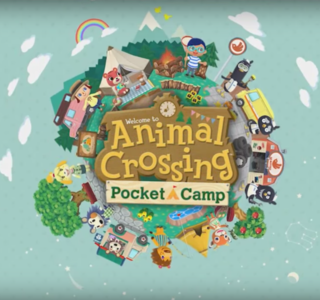
Log in to comment